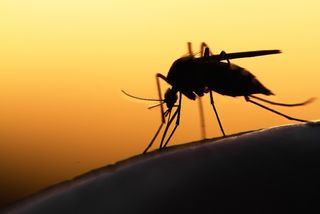West Nile Virus Gets Boost from US Drought

As drought continues to plague the Western United States, public health officials are warning residents of the region about an unexpected side effect of the dry weather: a greater likelihood of contracting West Nile virus.
This week, officials from the California Department of Public Health (CDPH) confirmed that a 65-year-old woman in Nevada County, California, died from an infection with the mosquito-borne disease. She was the first person in the state to succumb to West Nile virus this year. Earlier this month, two people died from West Nile virus infections in Maricopa County, Arizona — an area that is also experiencing severe drought conditions.
Of the 58 counties that make up the state of California, 33 have reported West Nile virus activity already this year. At this time in 2014, only 29 California counties had reported the disease, according to the CDPH. There were more than 800 reported cases of West Nile virus in California in 2014, resulting in 31 deaths — that's twice as many reported cases as in 2013 and twice as many associated fatalities. [It's Raining Spiders! Weirdest Effects of California Drought]
Too close for comfort
The state's lack of rainfall is related to those growing numbers, according to public health officials. As natural freshwater sources dry up, certain mosquito species that need this water must rely more heavily on artificial water sources, like swimming pools and other small bodies of standing water, which are located in residential areas. Mosquitoes— as well as the birds that mosquitoes feed on — are two of the species drawn to the backyards of Californians and Arizonians in greater numbers during a drought, according to the CDPH.
"Drought forces mosquitoes and wild birds to come into contact with one another, and wild birds are the major amplification host [for West Nile virus]," Jonathan Day, a professor of medical entomology at the University of Florida, told Live Science.
An amplification host, or amplifier host, describes a species that helps hasten the spread of infection of a disease. Wild birds quickly become infected with West Nile virus after being bitten by a mosquito carrying the disease (the incubation for the virus is just a few days in birds). Most birds that are infected don't die from the virus, but there is enough of the virus circulating in their blood that, when another mosquito feeds on them, the infected bird spreads the virus to that mosquito, carrying on the vicious cycle of the disease. Humans can get the virus when bitten by an infected mosquito.
Sign up for the Live Science daily newsletter now
Get the world’s most fascinating discoveries delivered straight to your inbox.
21 days later
However, this cycle of feasting on blood and spreading around viruses is only one part of the connection between West Nile virus and the ongoing drought. The other has to do with the reproductive behavior of the particular species of mosquito, Culex tarsalis, which carries West Nile virus in the Western United States.
When a female mosquito of this species is ready to lay her eggs, she takes what Day calls one last "blood meal" (i.e., a small feast on the blood of a bird or other animal) and then hunkers down to "mature" her eggs. If her final meal happens to be the blood of a wild bird infected with West Nile virus, then in 15 to 21 days, the mama mosquito will be a vector for the virus, meaning she can now spread West Nile virus to the next creature she bites. This happens regardless of whether the female is nurturing eggs. [10 Deadly Diseases That Hopped Across Species]
Luckily for humans, most female mosquitoes aren't likely to survive the 15 to 21 days needed for the virus to incubate, according to Day, who said that Culex females typically go through the gonotrophic cycle (the cycle of taking a blood meal and then laying eggs) about three times consecutively and then die. Since their gonotrophic cycles last only about five days, the females are usually dead before they can spread West Nile virus to the animals on which they feed.
That's what usually happens. During a drought, events can unfold a bit differently, according to Day.
"Some mosquitoes lay drought-resistant eggs in areas where flooding will occur at some future time. But with Culex mosquitoes, the female has to lay her eggs in a flooded environment," said Day, who added that this means female mosquitoes of this genus must find an area that will stay flooded for seven to 10 days to allow time for their eggs to go through larval development.
In times of drought, finding the perfect, watery spot to lay a plethora of tiny eggs (females usually lay 150 to 300 at a time) can be difficult. So what does C. tarsalis do? She waits.
A Culex female will wait weeks after taking her final blood meal for the right conditions to arise so that she can lay her eggs, Day said. And while she waits, she may be incubating West Nile virus. If she is, then the next animal she bites after laying her eggs could end up with West Nile virus, too.
"Droughts create a situation in which mosquitoes become very dangerous because, during a really severe drought, you end up with a lot of female mosquitoes that have been infected and are ready to transmit viruses. That's how you get these human epidemics," Day said.
Playing it safe
The effects that infected mosquitoes have on the humans who share their drought-reduced habitats are sobering. While only 31 of the 801 cases of West Nile virus reported last year resulted in deaths, 561 cases involved neuroinvasive illness, according to the Mosquito and Vector Control Association of California (MVCAC). The neuroinvasive form of West Nile virus affects the nervous system and can cause inflammation of neural tissues, leading to meningitis, in which the membranes around the brain and spinal cord become inflamed, and encephalitis (inflammation of the brain).
It's very likely that many more people were actually infected with the virus and simply did not exhibit symptoms last year, according to Day. About 1 in 5 people infected with West Nile virus experience severe symptoms, including fever and rash, and less than 1 percent of those infected experience severe neurological illness, according to the Centers for Disease Control.
To lower you chances of contracting the mosquito-borne disease, the MVCAC recommends practicing what it calls the 3 "Ds":
- DEET: Apply insect repellent containing DEET, picaridin, oil of lemon eucalyptus or IR3535, according to label instructions.
- Dawn and dusk: Wear protective clothing and repellent if you are outside during these times. Make sure that your doors and windows have tight-fitting screens to keep out mosquitoes. Repair or replace screens with tears or holes.
- Drain: Mosquitoes lay their eggs on standing water. Eliminate all sources of standing water on your property, including in flower pots, old car tires and buckets.
Follow Elizabeth Palermo @techEpalermo. Follow Live Science @livescience, Facebook & Google+. Original article on Live Science.

Elizabeth is a former Live Science associate editor and current director of audience development at the Chamber of Commerce. She graduated with a bachelor of arts degree from George Washington University. Elizabeth has traveled throughout the Americas, studying political systems and indigenous cultures and teaching English to students of all ages.
